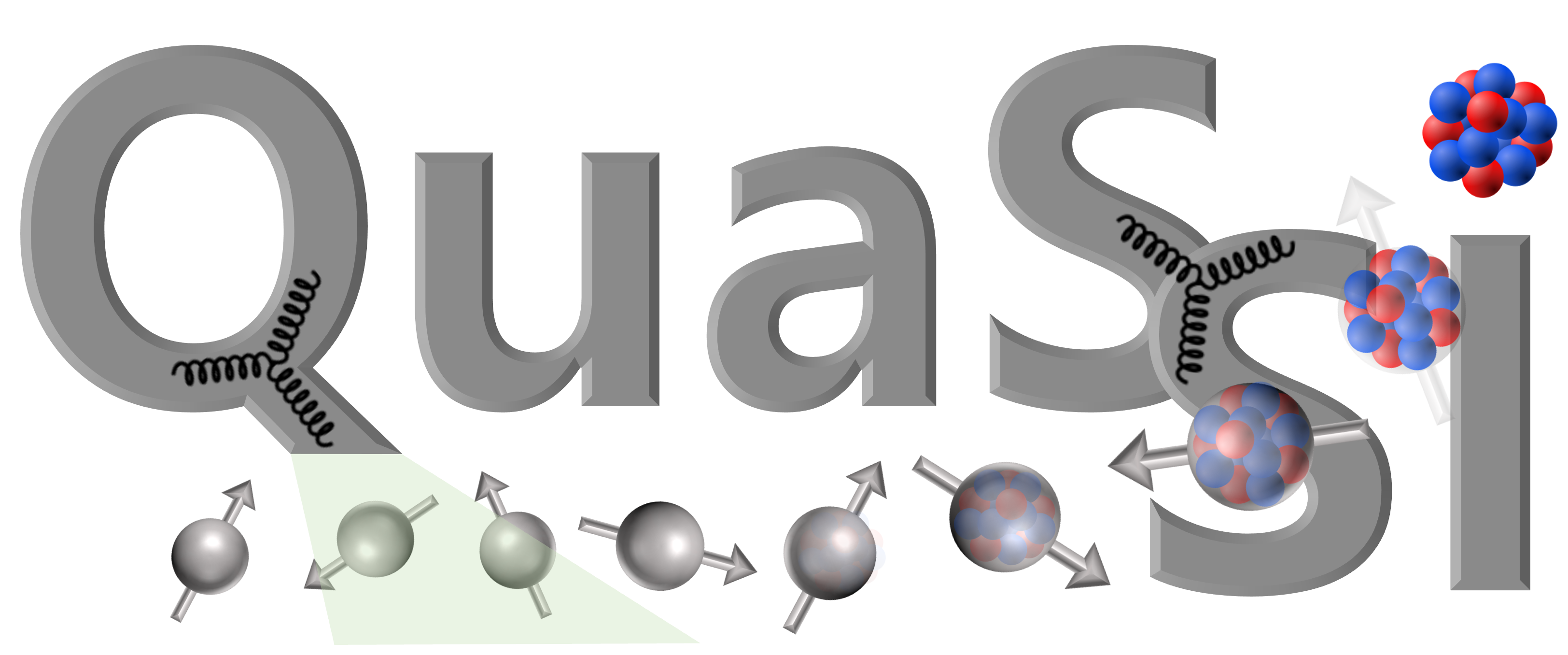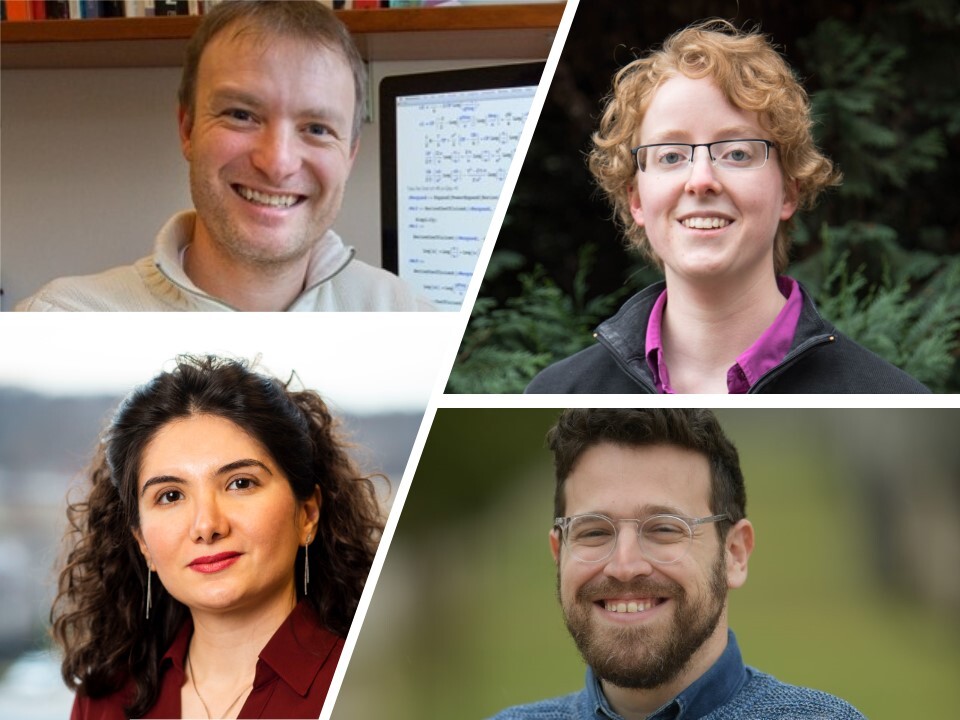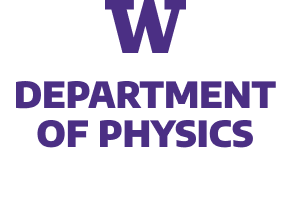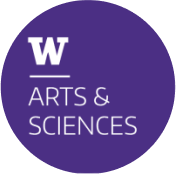
Quantum Simulation of Strong Interactions (QuaSI) Workshop 1 : Theoretical Strategies for Gauge Theories
Organizers: Christian Bauer (LBNL), Zohreh Davoudi (UMD), Natalie Klco (Caltech) and Erez Zohar (Jerusalem).
The discretized formulation of quantum field theories has provided a rigorous framework for ab initio numerical studies of gauge theories with controlled systematic uncertainties, supporting experimental efforts in nuclear and high-energy physics. However, growing multiplicities of the final states in highly energetic processes, accounting for exponential growth of dynamical configuration spaces, as well as real-time evolution of such configurations necessary in computing time-dependent observables, present fundamental limitations to our current methods. Consequently, a range of phenomena relevant to equilibrium and out-of-equilibrium phases of strongly interacting systems is computationally inaccessible. To extend beyond capabilities of the current lattice gauge theory program, radically different non-perturbative approaches may be required. One approach, proposed in the 1980’s by Feynman and others, is the introduction of quantum degrees of freedom directly into the computational framework—an approach that is showing potential with first examples of simulations having recently become experimentally feasible.
Fortuitously in light of the widely varying characteristics of promising quantum architectures, a similarly wide range of strategies for the quantum simulation of gauge theories has been developed in recent decades. The goal of this QuaSI workshop is to holistically and closely examine these complementary strategies as a community—concretely discussing their mechanisms for representing gauge fields with quantum degrees of freedom, their resulting quantum simulation strategies (state preparation, evolution, and measurements), and hence identifying their strengths and weaknesses for near-term and long-term performance.
Throughout the week, individuals and collaborators will host “QuaSI talks”—interactive presentations or discussion sessions. This QuaSI workshop serves as a beginning for an engaged network of physicists invested in the quantum simulation of strong interactions and will lay the groundwork for future interactions on topics ranging from theoretical developments to practical or conceivable quantum-hardware implementations.
What is a QuaSI Workshop?
“A QuaSI workshop is an avenue for cultivating new ideas and strategies to be built upon existing understandings and developments in a field that moves and expands rapidly. A QuaSI workshop is not a place for showcasing general ideas and flashing results, but is an environment for learning collectively and for investigating existing ideas in depth and at length. A QuaSI workshop is a ‘school’ for researchers at the forefront of developments and, at the same time, is a ‘workshop’ that examines and generates new ideas/methods through a focused effort. Interactions are at the core of a QuaSI workshop and our participants love talks and Q&A sessions using a (black)whiteboard (virtual or physical)!”
“A QuaSI workshop is a way to connect people from various backgrounds working broadly on simulation of the strong interaction on quantum computers. The goal of the workshop is not to advertise the latest work of individual groups, but rather to teach others in the field about the various approaches taken. Talks in the workshop should be more like mini-lectures than traditional conference presentations, with the idea that attendees can follow all steps of the lecture and learn important concepts that underly a given formalism. Active participation and questions are strongly encouraged during the talks.”
“The Quasi Workshop is a community-oriented workshop, in which we all join forces together. We teach and learn from each other, and become familiar with one another, with our works, our perspectives, and our future goals. This workshop is not about advertising our works or competing with each other, but rather on strengthening the connections in our field, both between people and research topics, building a synergetic community, eager to study, research and advance together.”
“A QuaSI workshop aims to create an inviting and focused environment for researchers within a field to develop together a foundation of concrete understanding and perspective through which future discoveries can be quickly contextualized and integrated. Guided by scientific understanding, a QuaSI workshop is designed to provide interactive and collaborative opportunities for deeply appreciating the ideas presented in our diverse and extensive literature and for nurturing community coherence going forward.”
Hourly Schedule
Tuesday, April 6
- 8.50am - 8.55am
- Welcome to IQuS
- Silas Beane, Martin Savage and David Kaplan
- 8.55am - 9.00am
- Quasi Organizer Welcome
- Christian Bauer, Zohreh Davoudi, Natalie Klco and Erez Zohar
- 9.00am - 9.40am
- The Gauss law and its application to the elimination of fields and replacing fermions by hard core bosons
- Erez Zohar (Hebrew University of Jerusalem)
- 9.40am - 10.20am
- Prepotentials, Schwinger bosons, loop-string-hadron formulations
- Indrakshi Raychowdhury (University of Maryland)
- 10.20am - 11.00am
- Gauss law oracles and gauge invariant time evolution
- Jesse Stryker (University of Maryland)
Wednesday, April 7
- 9.00am - 9.40am
- Analog simulation with fundamental symmetries
- Benni Reznik (Tel Aviv University)
- 9.40am - 10.20am
- Dual formulation of lattice gauge theory Hamiltonians using plaquette variables
- Julian Bender (Max-Planck-Institute of Quantum Optics, Garching)
- 10.20am - 11.00am
- Tensor networks of lattice gauge theories for the quantum-simulation era
- Mari Carmen Banuls (Max-Planck-Institute of Quantum Optics, Garching)
Thursday, April 8
- 9.00am - 9.40am
- Link models and qubit regularization
- Shailesh Chandrasekharan (Duke University)
- 9.40am - 10.20am
- Gauge invariance violation and emergent gauge symmetries
- Philipp Hauke (University of Trento)
- 10.20am - 11.00am
- Gauge invariance by dynamical decoupling and the Zeno effect
- Valentin Kasper (ICFO – The Institute of Photonic Sciences, Barcelona)
Friday, April 9
- 9.00am - 9.40am
- Group element basis and digital plaquette interactions
- Hank Lamm (Fermi National Accelerator Laboratory)
- 9.40am - 10.20am
- Local irreps for non-Abelian theories
- Natalie Klco (California Institute of Technology)
- 10.20am - 11.00am
- Orbifold lattices for Hamiltonian simulation
- Masanori Hanada (University of Surrey, UK)
Monday, April 12
- 9.00am - 9.40am
- Simulation strategies for scalar field theory
- Niklas Mueller (University of Maryland)
- 9.40am - 10.20am
- Simulation strategies for models of QCD and effective field theories
- Christian Bauer (Lawrence Berkeley National Laboratory) and Enrique Rico (University of Basque Country)
- 10.20am - 11.00am
- Perspectives by John Kogut and open discussion
- Christian Bauer, Zohreh Davoudi, Natalie Klco, John Kogut and Erez Zohar




